The Psychological Impact of Chronic Illness in Nursing Practice
VerifiedAdded on 2021/04/24
|7
|1524
|380
Report
AI Summary
This report presents an annotated bibliography that explores the psychological impact of chronic pain and chronic illness on patients, with a focus on implications for nursing practice. The bibliography synthesizes findings from two key articles: Lee, Chronister, & Bishop (2008), which examines the effects of psychosocial factors on the quality of life of individuals with chronic pain, and Müller et al. (2017), which investigates the association of chronic pain with depression and reduced quality of life in individuals with spinal cord injury. The analysis highlights the significant impact of chronic pain on patients' physical, psychosocial, and psychological functioning, leading to exhaustion, relationship problems, and psychological distress. The report emphasizes that nurses must consider the emotional and psychosocial consequences of chronic pain, alongside physical disabilities, and it underscores the importance of patient-centered care that addresses both physical and emotional needs. Effective nursing strategies include counseling, patient education, and social support initiatives, incorporating models like the Corbin and Straus illness trajectory model to promote patient well-being and encourage patients to share their experiences. The report concludes by advocating for a holistic approach to nursing care that recognizes the interplay between pain, social participation, anxiety, depression, and quality of life, ultimately improving patient outcomes.
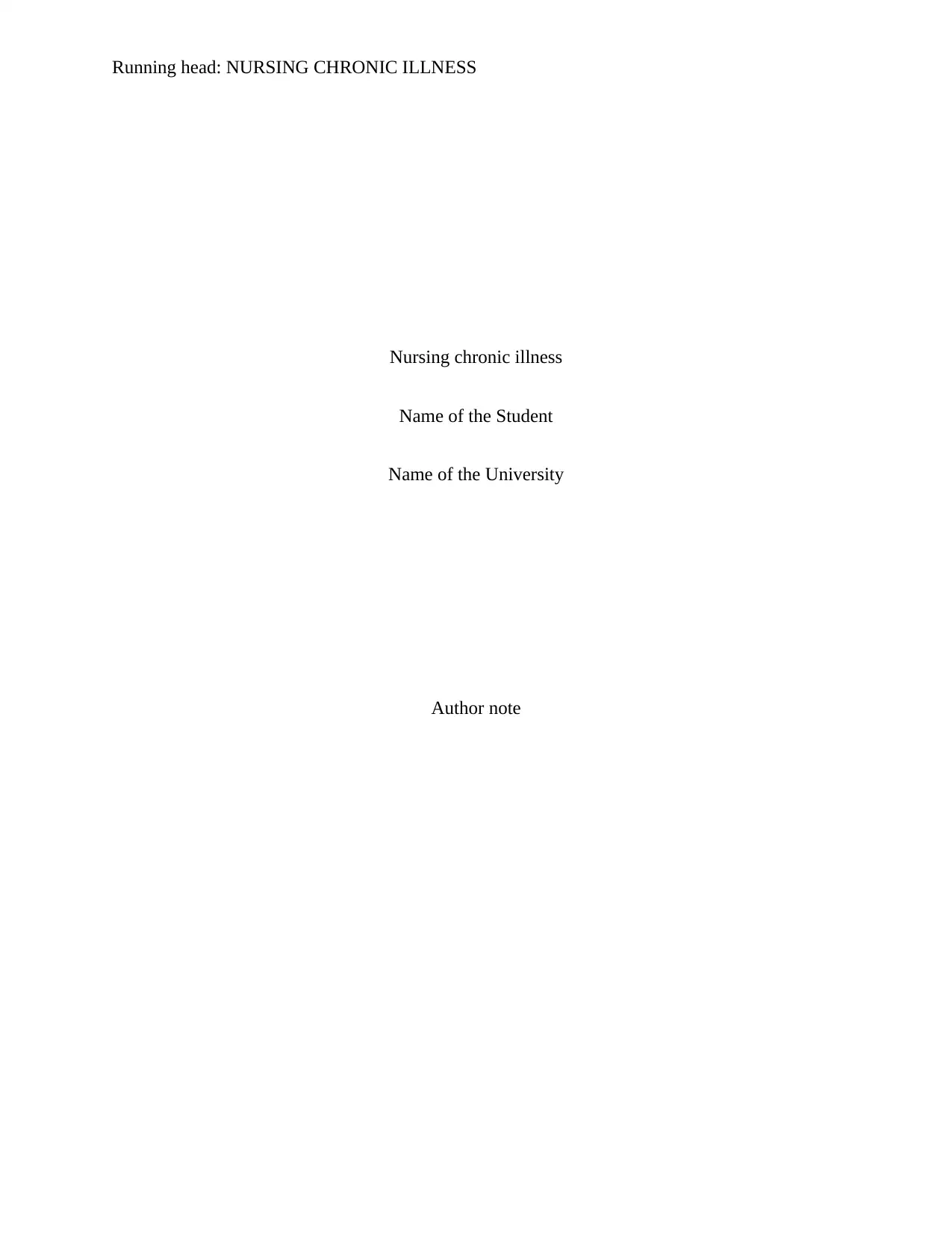
Running head: NURSING CHRONIC ILLNESS
Nursing chronic illness
Name of the Student
Name of the University
Author note
Nursing chronic illness
Name of the Student
Name of the University
Author note
Paraphrase This Document
Need a fresh take? Get an instant paraphrase of this document with our AI Paraphraser
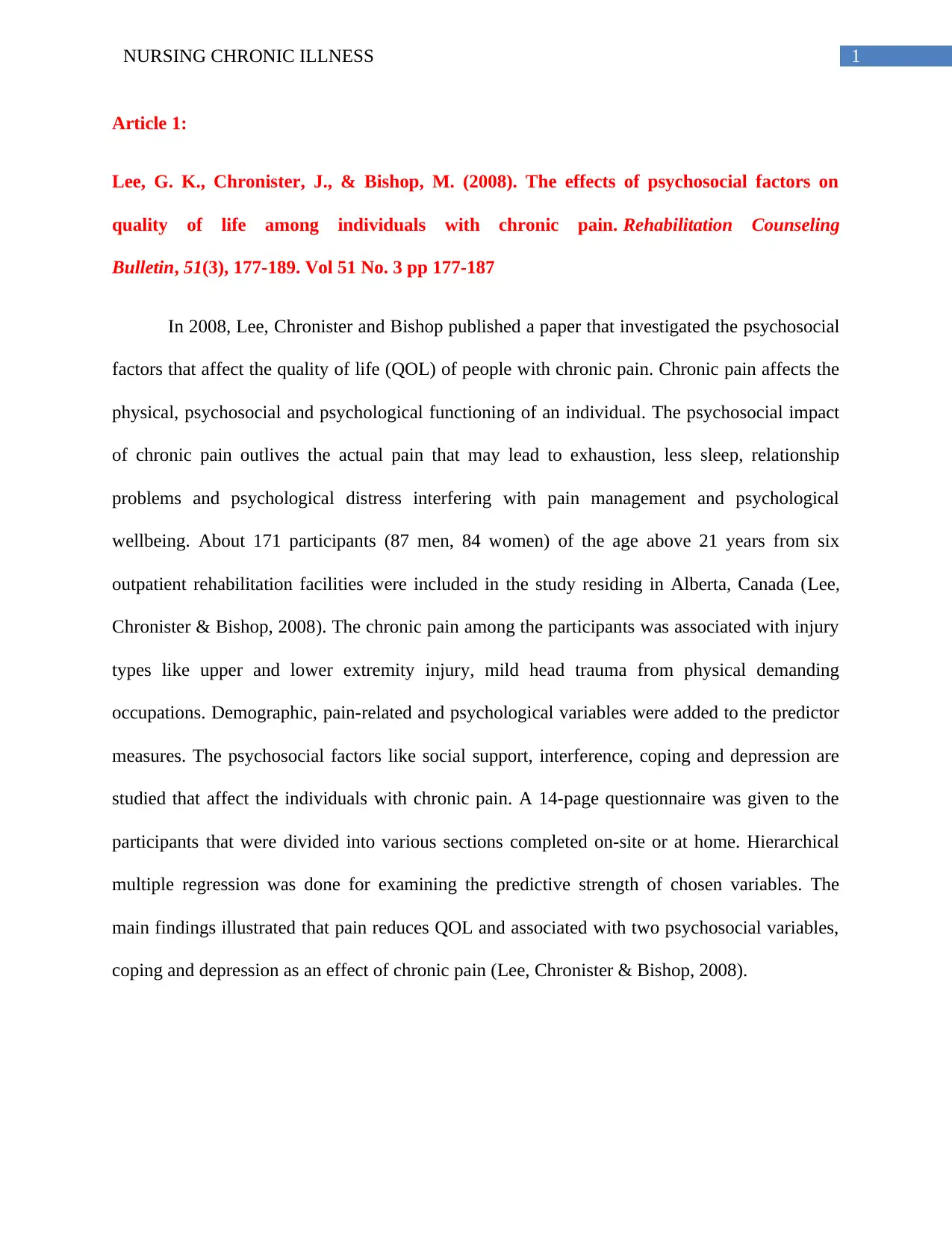
1NURSING CHRONIC ILLNESS
Article 1:
Lee, G. K., Chronister, J., & Bishop, M. (2008). The effects of psychosocial factors on
quality of life among individuals with chronic pain. Rehabilitation Counseling
Bulletin, 51(3), 177-189. Vol 51 No. 3 pp 177-187
In 2008, Lee, Chronister and Bishop published a paper that investigated the psychosocial
factors that affect the quality of life (QOL) of people with chronic pain. Chronic pain affects the
physical, psychosocial and psychological functioning of an individual. The psychosocial impact
of chronic pain outlives the actual pain that may lead to exhaustion, less sleep, relationship
problems and psychological distress interfering with pain management and psychological
wellbeing. About 171 participants (87 men, 84 women) of the age above 21 years from six
outpatient rehabilitation facilities were included in the study residing in Alberta, Canada (Lee,
Chronister & Bishop, 2008). The chronic pain among the participants was associated with injury
types like upper and lower extremity injury, mild head trauma from physical demanding
occupations. Demographic, pain-related and psychological variables were added to the predictor
measures. The psychosocial factors like social support, interference, coping and depression are
studied that affect the individuals with chronic pain. A 14-page questionnaire was given to the
participants that were divided into various sections completed on-site or at home. Hierarchical
multiple regression was done for examining the predictive strength of chosen variables. The
main findings illustrated that pain reduces QOL and associated with two psychosocial variables,
coping and depression as an effect of chronic pain (Lee, Chronister & Bishop, 2008).
Article 1:
Lee, G. K., Chronister, J., & Bishop, M. (2008). The effects of psychosocial factors on
quality of life among individuals with chronic pain. Rehabilitation Counseling
Bulletin, 51(3), 177-189. Vol 51 No. 3 pp 177-187
In 2008, Lee, Chronister and Bishop published a paper that investigated the psychosocial
factors that affect the quality of life (QOL) of people with chronic pain. Chronic pain affects the
physical, psychosocial and psychological functioning of an individual. The psychosocial impact
of chronic pain outlives the actual pain that may lead to exhaustion, less sleep, relationship
problems and psychological distress interfering with pain management and psychological
wellbeing. About 171 participants (87 men, 84 women) of the age above 21 years from six
outpatient rehabilitation facilities were included in the study residing in Alberta, Canada (Lee,
Chronister & Bishop, 2008). The chronic pain among the participants was associated with injury
types like upper and lower extremity injury, mild head trauma from physical demanding
occupations. Demographic, pain-related and psychological variables were added to the predictor
measures. The psychosocial factors like social support, interference, coping and depression are
studied that affect the individuals with chronic pain. A 14-page questionnaire was given to the
participants that were divided into various sections completed on-site or at home. Hierarchical
multiple regression was done for examining the predictive strength of chosen variables. The
main findings illustrated that pain reduces QOL and associated with two psychosocial variables,
coping and depression as an effect of chronic pain (Lee, Chronister & Bishop, 2008).
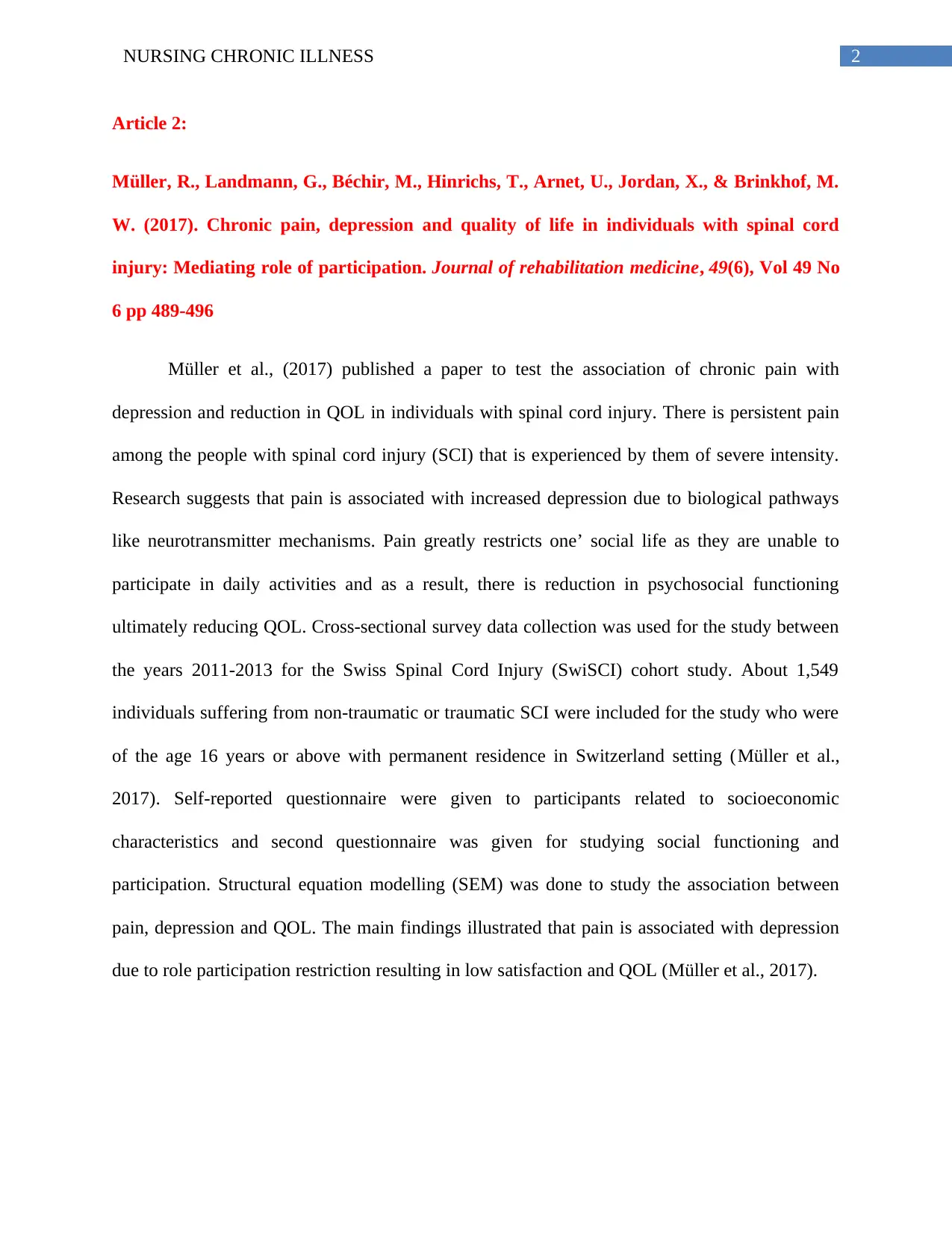
2NURSING CHRONIC ILLNESS
Article 2:
Müller, R., Landmann, G., Béchir, M., Hinrichs, T., Arnet, U., Jordan, X., & Brinkhof, M.
W. (2017). Chronic pain, depression and quality of life in individuals with spinal cord
injury: Mediating role of participation. Journal of rehabilitation medicine, 49(6), Vol 49 No
6 pp 489-496
Müller et al., (2017) published a paper to test the association of chronic pain with
depression and reduction in QOL in individuals with spinal cord injury. There is persistent pain
among the people with spinal cord injury (SCI) that is experienced by them of severe intensity.
Research suggests that pain is associated with increased depression due to biological pathways
like neurotransmitter mechanisms. Pain greatly restricts one’ social life as they are unable to
participate in daily activities and as a result, there is reduction in psychosocial functioning
ultimately reducing QOL. Cross-sectional survey data collection was used for the study between
the years 2011-2013 for the Swiss Spinal Cord Injury (SwiSCI) cohort study. About 1,549
individuals suffering from non-traumatic or traumatic SCI were included for the study who were
of the age 16 years or above with permanent residence in Switzerland setting (Müller et al.,
2017). Self-reported questionnaire were given to participants related to socioeconomic
characteristics and second questionnaire was given for studying social functioning and
participation. Structural equation modelling (SEM) was done to study the association between
pain, depression and QOL. The main findings illustrated that pain is associated with depression
due to role participation restriction resulting in low satisfaction and QOL (Müller et al., 2017).
Article 2:
Müller, R., Landmann, G., Béchir, M., Hinrichs, T., Arnet, U., Jordan, X., & Brinkhof, M.
W. (2017). Chronic pain, depression and quality of life in individuals with spinal cord
injury: Mediating role of participation. Journal of rehabilitation medicine, 49(6), Vol 49 No
6 pp 489-496
Müller et al., (2017) published a paper to test the association of chronic pain with
depression and reduction in QOL in individuals with spinal cord injury. There is persistent pain
among the people with spinal cord injury (SCI) that is experienced by them of severe intensity.
Research suggests that pain is associated with increased depression due to biological pathways
like neurotransmitter mechanisms. Pain greatly restricts one’ social life as they are unable to
participate in daily activities and as a result, there is reduction in psychosocial functioning
ultimately reducing QOL. Cross-sectional survey data collection was used for the study between
the years 2011-2013 for the Swiss Spinal Cord Injury (SwiSCI) cohort study. About 1,549
individuals suffering from non-traumatic or traumatic SCI were included for the study who were
of the age 16 years or above with permanent residence in Switzerland setting (Müller et al.,
2017). Self-reported questionnaire were given to participants related to socioeconomic
characteristics and second questionnaire was given for studying social functioning and
participation. Structural equation modelling (SEM) was done to study the association between
pain, depression and QOL. The main findings illustrated that pain is associated with depression
due to role participation restriction resulting in low satisfaction and QOL (Müller et al., 2017).
⊘ This is a preview!⊘
Do you want full access?
Subscribe today to unlock all pages.

Trusted by 1+ million students worldwide
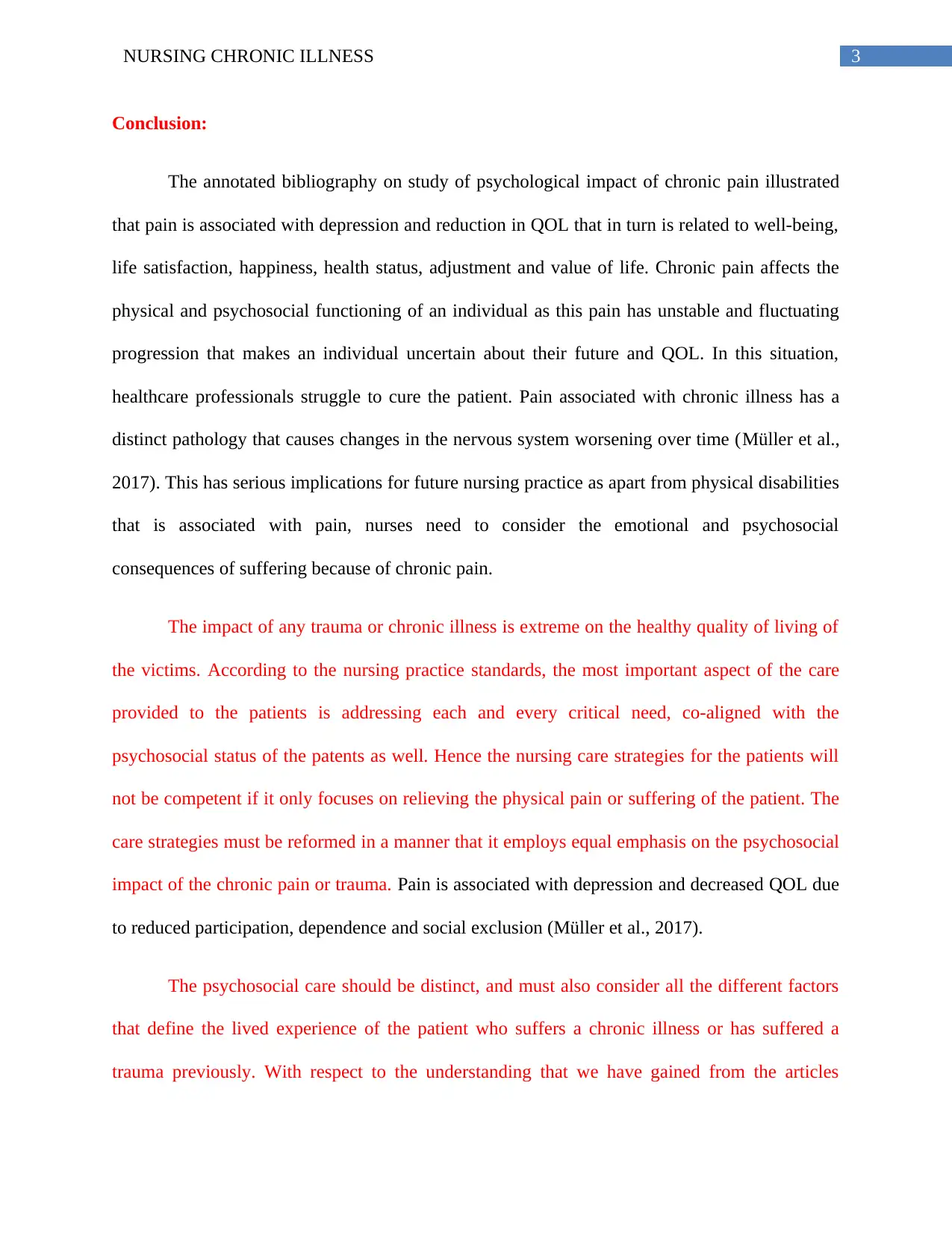
3NURSING CHRONIC ILLNESS
Conclusion:
The annotated bibliography on study of psychological impact of chronic pain illustrated
that pain is associated with depression and reduction in QOL that in turn is related to well-being,
life satisfaction, happiness, health status, adjustment and value of life. Chronic pain affects the
physical and psychosocial functioning of an individual as this pain has unstable and fluctuating
progression that makes an individual uncertain about their future and QOL. In this situation,
healthcare professionals struggle to cure the patient. Pain associated with chronic illness has a
distinct pathology that causes changes in the nervous system worsening over time (Müller et al.,
2017). This has serious implications for future nursing practice as apart from physical disabilities
that is associated with pain, nurses need to consider the emotional and psychosocial
consequences of suffering because of chronic pain.
The impact of any trauma or chronic illness is extreme on the healthy quality of living of
the victims. According to the nursing practice standards, the most important aspect of the care
provided to the patients is addressing each and every critical need, co-aligned with the
psychosocial status of the patents as well. Hence the nursing care strategies for the patients will
not be competent if it only focuses on relieving the physical pain or suffering of the patient. The
care strategies must be reformed in a manner that it employs equal emphasis on the psychosocial
impact of the chronic pain or trauma. Pain is associated with depression and decreased QOL due
to reduced participation, dependence and social exclusion (Müller et al., 2017).
The psychosocial care should be distinct, and must also consider all the different factors
that define the lived experience of the patient who suffers a chronic illness or has suffered a
trauma previously. With respect to the understanding that we have gained from the articles
Conclusion:
The annotated bibliography on study of psychological impact of chronic pain illustrated
that pain is associated with depression and reduction in QOL that in turn is related to well-being,
life satisfaction, happiness, health status, adjustment and value of life. Chronic pain affects the
physical and psychosocial functioning of an individual as this pain has unstable and fluctuating
progression that makes an individual uncertain about their future and QOL. In this situation,
healthcare professionals struggle to cure the patient. Pain associated with chronic illness has a
distinct pathology that causes changes in the nervous system worsening over time (Müller et al.,
2017). This has serious implications for future nursing practice as apart from physical disabilities
that is associated with pain, nurses need to consider the emotional and psychosocial
consequences of suffering because of chronic pain.
The impact of any trauma or chronic illness is extreme on the healthy quality of living of
the victims. According to the nursing practice standards, the most important aspect of the care
provided to the patients is addressing each and every critical need, co-aligned with the
psychosocial status of the patents as well. Hence the nursing care strategies for the patients will
not be competent if it only focuses on relieving the physical pain or suffering of the patient. The
care strategies must be reformed in a manner that it employs equal emphasis on the psychosocial
impact of the chronic pain or trauma. Pain is associated with depression and decreased QOL due
to reduced participation, dependence and social exclusion (Müller et al., 2017).
The psychosocial care should be distinct, and must also consider all the different factors
that define the lived experience of the patient who suffers a chronic illness or has suffered a
trauma previously. With respect to the understanding that we have gained from the articles
Paraphrase This Document
Need a fresh take? Get an instant paraphrase of this document with our AI Paraphraser
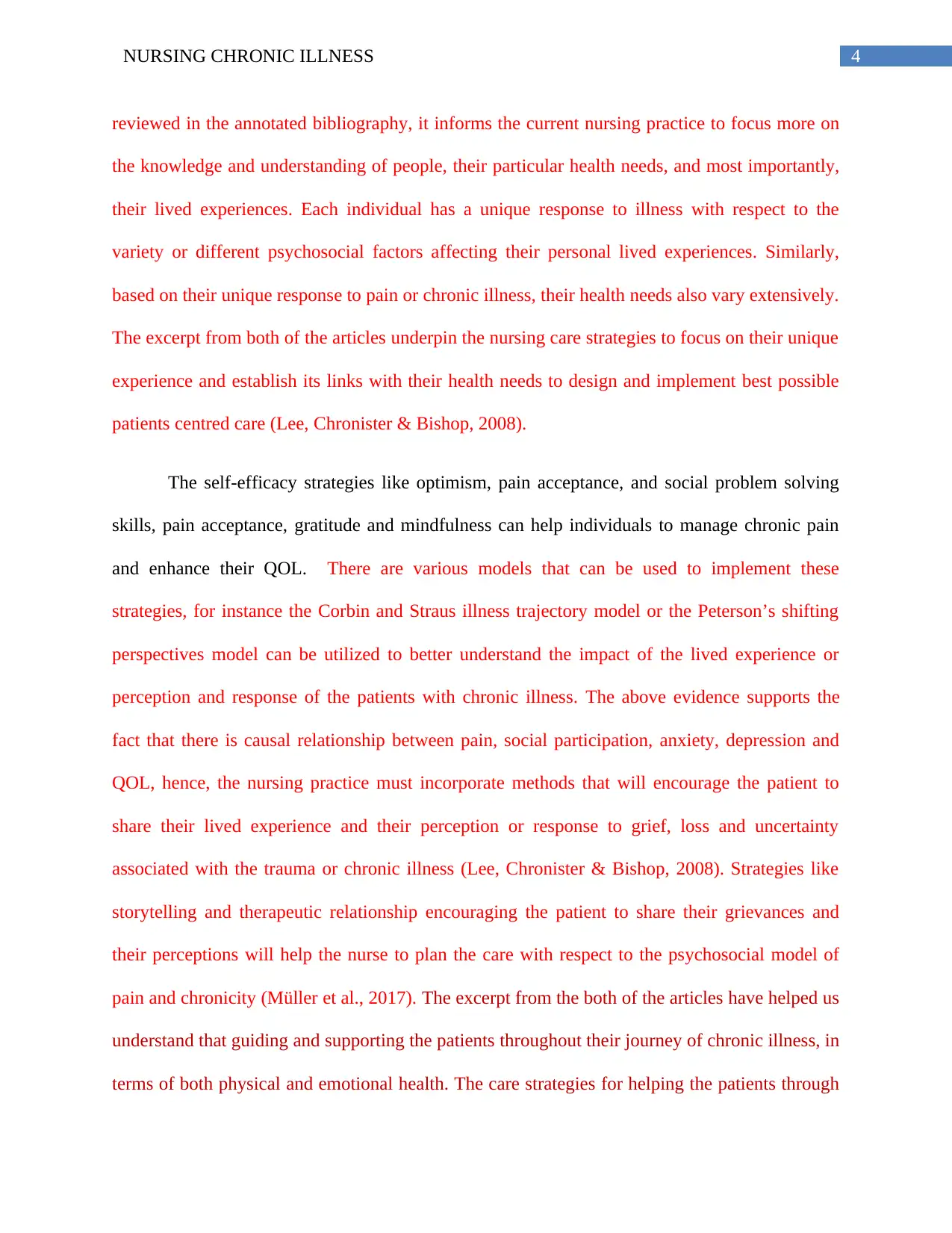
4NURSING CHRONIC ILLNESS
reviewed in the annotated bibliography, it informs the current nursing practice to focus more on
the knowledge and understanding of people, their particular health needs, and most importantly,
their lived experiences. Each individual has a unique response to illness with respect to the
variety or different psychosocial factors affecting their personal lived experiences. Similarly,
based on their unique response to pain or chronic illness, their health needs also vary extensively.
The excerpt from both of the articles underpin the nursing care strategies to focus on their unique
experience and establish its links with their health needs to design and implement best possible
patients centred care (Lee, Chronister & Bishop, 2008).
The self-efficacy strategies like optimism, pain acceptance, and social problem solving
skills, pain acceptance, gratitude and mindfulness can help individuals to manage chronic pain
and enhance their QOL. There are various models that can be used to implement these
strategies, for instance the Corbin and Straus illness trajectory model or the Peterson’s shifting
perspectives model can be utilized to better understand the impact of the lived experience or
perception and response of the patients with chronic illness. The above evidence supports the
fact that there is causal relationship between pain, social participation, anxiety, depression and
QOL, hence, the nursing practice must incorporate methods that will encourage the patient to
share their lived experience and their perception or response to grief, loss and uncertainty
associated with the trauma or chronic illness (Lee, Chronister & Bishop, 2008). Strategies like
storytelling and therapeutic relationship encouraging the patient to share their grievances and
their perceptions will help the nurse to plan the care with respect to the psychosocial model of
pain and chronicity (Müller et al., 2017). The excerpt from the both of the articles have helped us
understand that guiding and supporting the patients throughout their journey of chronic illness, in
terms of both physical and emotional health. The care strategies for helping the patients through
reviewed in the annotated bibliography, it informs the current nursing practice to focus more on
the knowledge and understanding of people, their particular health needs, and most importantly,
their lived experiences. Each individual has a unique response to illness with respect to the
variety or different psychosocial factors affecting their personal lived experiences. Similarly,
based on their unique response to pain or chronic illness, their health needs also vary extensively.
The excerpt from both of the articles underpin the nursing care strategies to focus on their unique
experience and establish its links with their health needs to design and implement best possible
patients centred care (Lee, Chronister & Bishop, 2008).
The self-efficacy strategies like optimism, pain acceptance, and social problem solving
skills, pain acceptance, gratitude and mindfulness can help individuals to manage chronic pain
and enhance their QOL. There are various models that can be used to implement these
strategies, for instance the Corbin and Straus illness trajectory model or the Peterson’s shifting
perspectives model can be utilized to better understand the impact of the lived experience or
perception and response of the patients with chronic illness. The above evidence supports the
fact that there is causal relationship between pain, social participation, anxiety, depression and
QOL, hence, the nursing practice must incorporate methods that will encourage the patient to
share their lived experience and their perception or response to grief, loss and uncertainty
associated with the trauma or chronic illness (Lee, Chronister & Bishop, 2008). Strategies like
storytelling and therapeutic relationship encouraging the patient to share their grievances and
their perceptions will help the nurse to plan the care with respect to the psychosocial model of
pain and chronicity (Müller et al., 2017). The excerpt from the both of the articles have helped us
understand that guiding and supporting the patients throughout their journey of chronic illness, in
terms of both physical and emotional health. The care strategies for helping the patients through
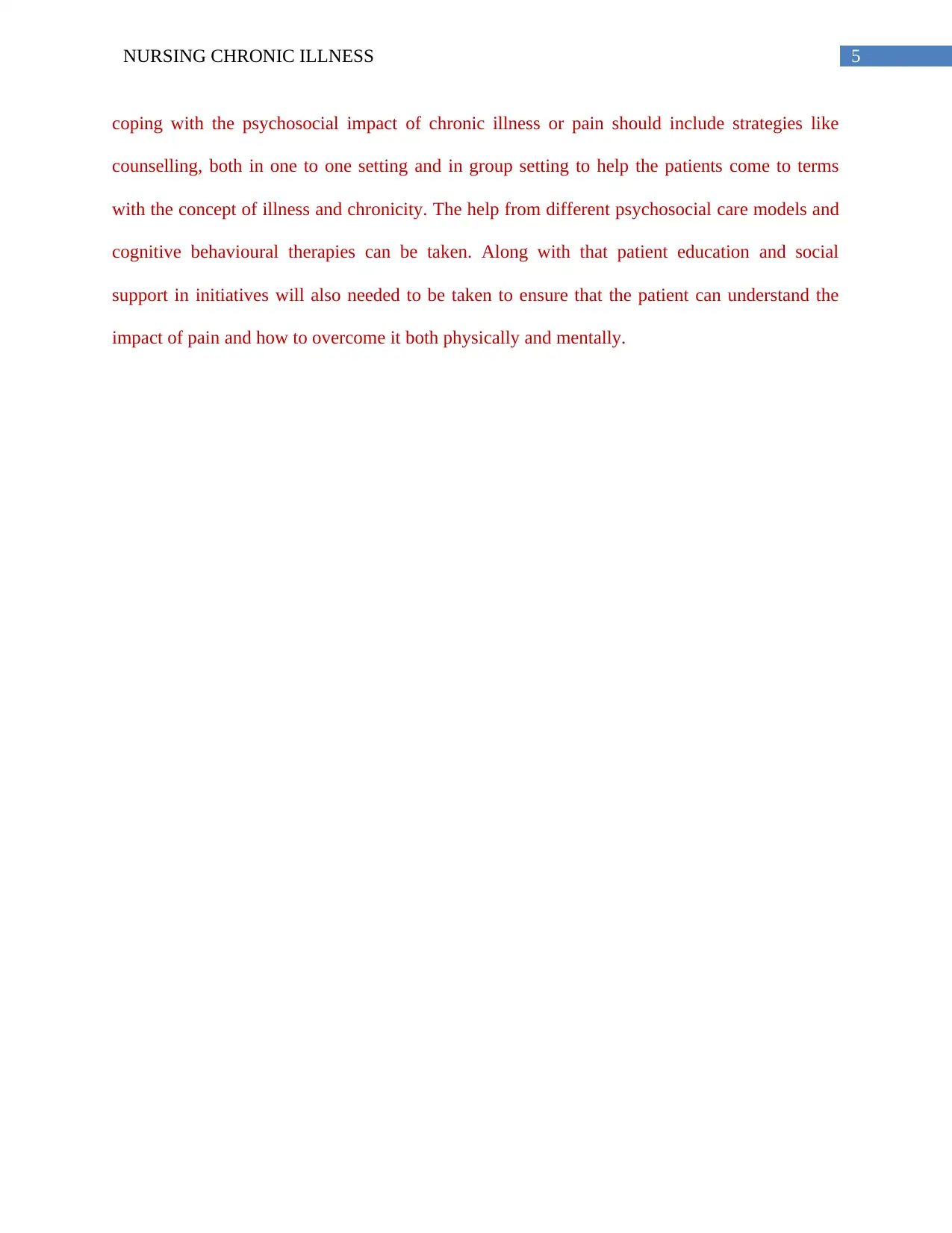
5NURSING CHRONIC ILLNESS
coping with the psychosocial impact of chronic illness or pain should include strategies like
counselling, both in one to one setting and in group setting to help the patients come to terms
with the concept of illness and chronicity. The help from different psychosocial care models and
cognitive behavioural therapies can be taken. Along with that patient education and social
support in initiatives will also needed to be taken to ensure that the patient can understand the
impact of pain and how to overcome it both physically and mentally.
coping with the psychosocial impact of chronic illness or pain should include strategies like
counselling, both in one to one setting and in group setting to help the patients come to terms
with the concept of illness and chronicity. The help from different psychosocial care models and
cognitive behavioural therapies can be taken. Along with that patient education and social
support in initiatives will also needed to be taken to ensure that the patient can understand the
impact of pain and how to overcome it both physically and mentally.
⊘ This is a preview!⊘
Do you want full access?
Subscribe today to unlock all pages.

Trusted by 1+ million students worldwide
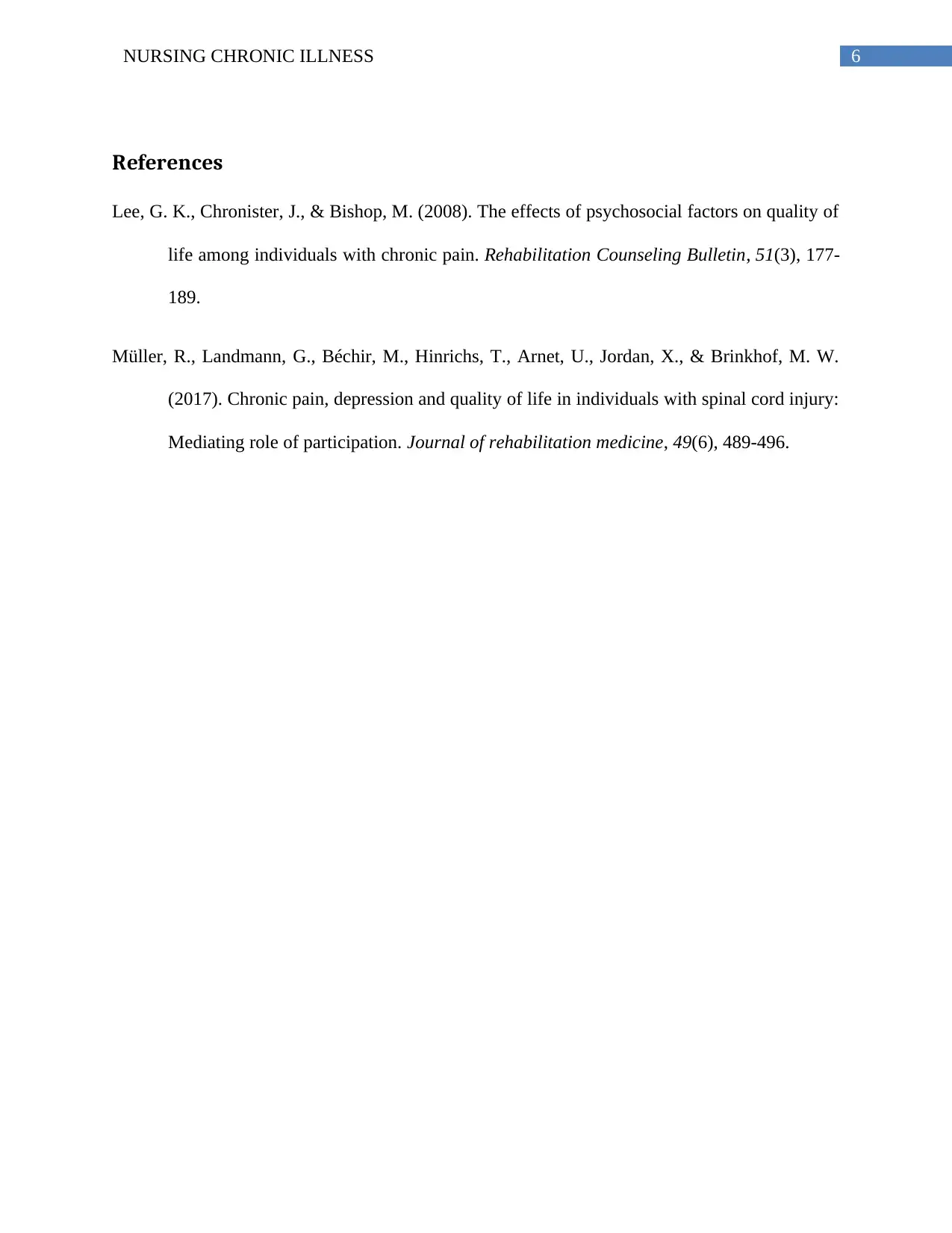
6NURSING CHRONIC ILLNESS
References
Lee, G. K., Chronister, J., & Bishop, M. (2008). The effects of psychosocial factors on quality of
life among individuals with chronic pain. Rehabilitation Counseling Bulletin, 51(3), 177-
189.
Müller, R., Landmann, G., Béchir, M., Hinrichs, T., Arnet, U., Jordan, X., & Brinkhof, M. W.
(2017). Chronic pain, depression and quality of life in individuals with spinal cord injury:
Mediating role of participation. Journal of rehabilitation medicine, 49(6), 489-496.
References
Lee, G. K., Chronister, J., & Bishop, M. (2008). The effects of psychosocial factors on quality of
life among individuals with chronic pain. Rehabilitation Counseling Bulletin, 51(3), 177-
189.
Müller, R., Landmann, G., Béchir, M., Hinrichs, T., Arnet, U., Jordan, X., & Brinkhof, M. W.
(2017). Chronic pain, depression and quality of life in individuals with spinal cord injury:
Mediating role of participation. Journal of rehabilitation medicine, 49(6), 489-496.
1 out of 7
Your All-in-One AI-Powered Toolkit for Academic Success.
+13062052269
info@desklib.com
Available 24*7 on WhatsApp / Email
![[object Object]](/_next/static/media/star-bottom.7253800d.svg)
Unlock your academic potential
Copyright © 2020–2026 A2Z Services. All Rights Reserved. Developed and managed by ZUCOL.